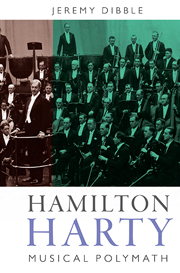Book contents
- Frontmatter
- Dedication
- Contents
- List of Illustrations
- List of Music Examples
- Preface
- Abbreviations
- Epigraph
- 1 1879–1901 Hillsborough, Belfast and Dublin: A Musical Apprenticeship
- 2 1901–9 London (1): A Pre-eminent ‘Collaborator’ and Aspiring Composer
- 3 1909–14 London (2): Composer and Conductor
- 4 1914–20 The War Years and After
- 5 1920–27 The Hallé Years
- 6 1927–33 Apogee: From Hallé to the LSO
- 7 1933–6 America and Australia: An Unforeseen Romance
- 8 1936–41 The Last Years: The Children of Lir – A Creative Codicil
- APPENDIX 1 List of Works
- APPENDIX 2 List of Recordings
- Bibliography
- Index of Harty's Works
- General Index
- Music in Britain, 1600–2000
5 - 1920–27 The Hallé Years
Published online by Cambridge University Press: 05 December 2013
- Frontmatter
- Dedication
- Contents
- List of Illustrations
- List of Music Examples
- Preface
- Abbreviations
- Epigraph
- 1 1879–1901 Hillsborough, Belfast and Dublin: A Musical Apprenticeship
- 2 1901–9 London (1): A Pre-eminent ‘Collaborator’ and Aspiring Composer
- 3 1909–14 London (2): Composer and Conductor
- 4 1914–20 The War Years and After
- 5 1920–27 The Hallé Years
- 6 1927–33 Apogee: From Hallé to the LSO
- 7 1933–6 America and Australia: An Unforeseen Romance
- 8 1936–41 The Last Years: The Children of Lir – A Creative Codicil
- APPENDIX 1 List of Works
- APPENDIX 2 List of Recordings
- Bibliography
- Index of Harty's Works
- General Index
- Music in Britain, 1600–2000
Summary
Harty's contract (which he always accepted as a gentleman's agreement) was initially a fee of 650 guineas (about £30,000 by today's money) for thirty concerts, and for each additional concert, 25 guineas. The Manchester season, it was agreed, would consist of eighteen concerts, the traditional performance of Messiah at Christmas, and a concert for the orchestra's Pension Fund. It was also agreed that Harty would be free to continue his engagements with other orchestras in London, Leeds and elsewhere (which included a new appointment as a joint conductor at the North Staffordshire Choral Society), provided they did not impinge on his Manchester commitments. Harty also agreed to move his residence to the city, a factor which would add weight to the impression of ‘permanence’ (as well as satisfying those members who disliked the system of guest conductors) while also providing stability to the longer-term planning of the orchestra. Moreover, the Board's appointment of Harty, whose artistic sympathies lay entirely with orchestral music, also meant that musical emphasis in the city would now be placed on the concert hall rather than the opera house (which, for some members, was perceived as a disruptive influence on the traditionally ‘private’ ethos of the Hallé). Beecham expressed his satisfaction at the new arrangement, but the Board was still anxious about the broader financial aspects of the orchestra's accounts. The players wanted a fifty percent increase in their fees, and, besides the conductor's fee, the cost of visiting artists was now also much higher.
- Type
- Chapter
- Information
- Hamilton HartyMusical Polymath, pp. 143 - 187Publisher: Boydell & BrewerPrint publication year: 2013



